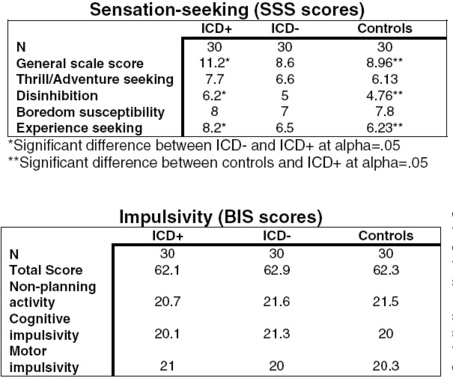The WAGER, Vol 4(14) – Sensation-seeking and Impulsivity
Several studies have examined the relationship between pathological gambling, sensation seeking, and impulsivity. That the latter has received special attention is likely a function of DSM-IV’s classification of pathological gambling as an impulse control disorder (ICD). Lejoyeux, Feuche, Loi, Solomon, and Ades (1998) add to this discourse by employing a particularly interesting and rigorous methodology. Drawing from a population of patients hospitalized for alcohol detoxification, the authors assembled two age and sex-matched groups: one composed of alcoholics with ICDs and one composed of alcoholics with no ICD comorbidity. A third control group included subjects without psychiatric disorders, also age and sex-matched. The Zuckerman Sensation-Seeking Scale (SSS) was administered to measure general sensation-seeking and its components: thrill and adventure seeking, disinhibition, boredom susceptibility, and experience seeking. To measure impulsivity, the subject were scored on the Barratt Impulsiveness Rating Scale (BIS), whose components are non-planning activity, cognitive impulsivity, and motor impulsivity. The tables present the results.
Subjects with ICDs had higher sensation-seeking scores than their counterparts. In particular, differences were found for the disinhibition and experience seeking components. In contrast, impulsivity scores among the three groups did not differ significantly. Thus, sensation-seeking and not impulsivity differentiates alcoholics with ICDs from those without. Of the ICD+ group, subjects diagnosed with pathological gambling tended to rate higher on the sensation-seeking scale than the ICD- group.
While the authors admit that the small size of their sample limits the power of their study, they have contributed significantly to the sensation-seeking and impulsivity debate that will likely grow in salience as future editions of the DSM-IV grapple with how to classify pathological gambling.
Source: Lejoyeux, M., Feuche, N., Loi, S., Solomon, J., & Ades, J. (1998). Impulse-control disorders in alcoholics are related to sensation seeking and not to impulsivity. Psychiatry Research, 81, 149-155
